I don't know if you read part 1: Growing up, but regardless i will remind you where we left off.
In 1914, Hitler fled to Munich to avoid mandatory military service, but the Munich police came to his house and told him that he had to report to the police office in Linz because he had not reported for military duty. Hitler was freaked out because he could potentially be imprisoned so he wrote a letter to the Austrian Consulate apologizing and using his tough life as an excuse. He was forgiven, but had to report Salzburg for his medical assessment, which he failed. After he failed, the whole matter was dropped.

Hitler returned to Munich and painted for money. When asked how he would make a permanent living, Hitler said it did not matter since there soon be a war. And boy was he right..
Allegedly, Hitler claimed that he ran away from serving for the Austro-Hungarian Army because of the mixture of races in its army and his belief that the collapse of Austria-Hungary was imminent.
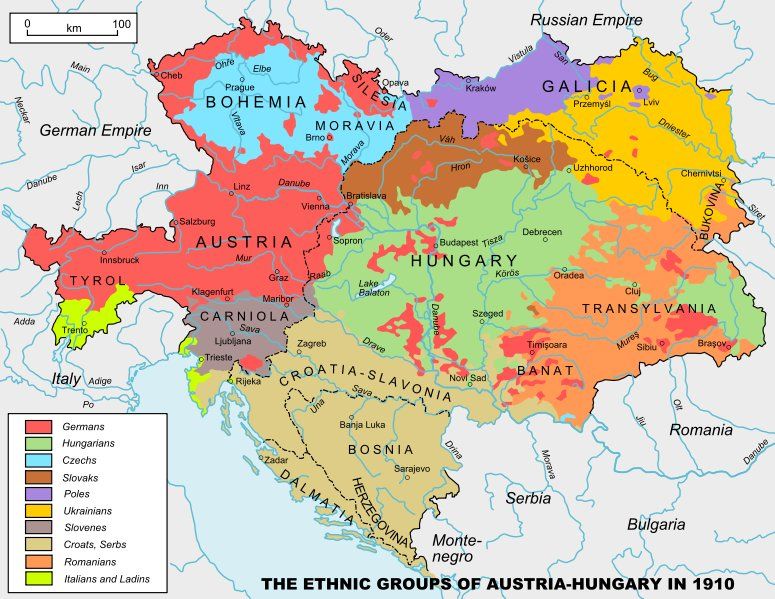
Austria-Hungary's occupation of Bosnia and Herzegovina came in 1878 after it was approved by the Congress of Berlin and was completed in 1908.
Bosnia and Herzegovina is a country on the Balkan Peninsula in southeastern Europe. Its countryside is home to medieval villages, rivers and lakes, plus Dinaric Alps. The national capital is Sarajevo.
The Austrian-Hungarian occupation angered the Serbians.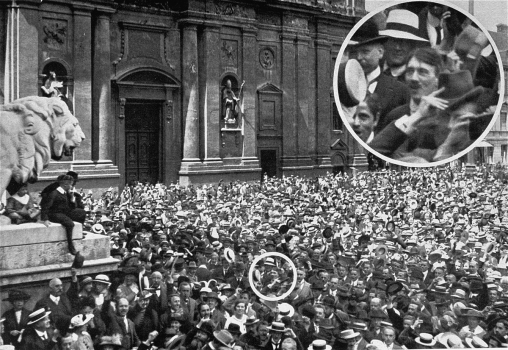 On August 2nd, 1914, an enthusiastic crowd gathered in the public plaza in Munich to celebrate the Germany entering World War I. To many people it appeared that Hitler was in the crowd, there are some that say it was not him.
On August 2nd, 1914, an enthusiastic crowd gathered in the public plaza in Munich to celebrate the Germany entering World War I. To many people it appeared that Hitler was in the crowd, there are some that say it was not him.


Franz Ferdinand was an Austrian archduke, a Hungarian and a Bohemian prince.

What was the catalyst for World War I? A Bullet.


Most people will tell you the main trigger of WWI was the assassination of Franz Ferdinand and his pregnant wife Sophie.
When Franz’ nephew Crown Prince Rudolf committed suicide joint suicide in 1889 and Franz' father Karl Ludwig died of typhoid fever in 1896 Franz became the next in line to the Austro-Hungarian throne.
Franz was allowed to marry his lady-in-waiting Sophie Chotek after he renounced his descendants' rights to the throne.
"By far the cleverest thing I ever did in my life was to marry my Sophie. She is everything for me: my wife, my doctor, my advisor — in a word my whole happiness. …And then our children! They are my whole pride and joy. I sit with them all day long in amazement that I can love them so much. And then the evenings at home when I smoke my cigar and read my papers. Sophie knits and the children tumble about, knocking everything off the tables. It’s all so cozy and precious…"-Franz Ferdinand
He rose quickly in the military and ended up being very influential. In 1913 he was appointed inspector general of the Austro-Hungarian armed forces.
Franz wanted to federalize Austria-Hungary and have 16 member states with separate governments. He also wanted to ensure that the ethnic Slavs(Serbians) had a voice in these state governments. He regarded Hungarian nationalism as a revolutionary threat to the Habsburg dynasty. He also advocated a cautious approach towards Serbia warning that harsh treatment of Serbia would bring Austria-Hungary into open conflict with Russia.
If only they would have listened to him about Serbia.
So there are conflicting stories about why Franz went to Sarajevo. Some claim that Franz was there for a museum opening. Some say that Governor-General Oskar Potiorek invited him there to watch military maneuvers or a hospital opening. Regardless, Franz was a little weary to go. His uncle, the Emperor Franz Josef, had an attempt made on his life in Saragevo in 1911 by the Black Hand.
 Čabrinović swallowed an expired cyanide pill and jumped into the River Milajacka. However, the pill only made him vomit, and the river was only 4 inches deep. He was pulled out and as he was taken away by police allegedly saying, "I am a Serb hero."
Čabrinović swallowed an expired cyanide pill and jumped into the River Milajacka. However, the pill only made him vomit, and the river was only 4 inches deep. He was pulled out and as he was taken away by police allegedly saying, "I am a Serb hero."
The Black hand was a secret military society aiming to unite all of the territories with a South Slavic majority not ruled by either Serbia or Montenegro.

Despite his fears, Franz decided to go. On Sunday, June 28th 1914, the royal couple arrived in Sarajevo just before 10 a.m. At 10:15 they were in the third car of a six-car procession passing the central police station. Their car had an opened roof so they could wave at the spectators.

That is when a member of the Black Hand named Nedeljko Čabrinović hurled a hand grenade at Franz's car. Thankfully the driver saw the object flying towards him and step on the gas. However, due to the bomb having a 10-second delay, it exploded under the wheel of the fourth car and injured two of the occupants. About a dozen spectators were also injured by shrapnel.

He was not the brightest was he?
Franz and his wife were taken to the town hall for a scheduled reception. When they arrived a very angry Franz interrupted the mayor's welcome speech. "Mr. Mayor, I came here on a visit and I am greeted with bombs. It is outrageous."
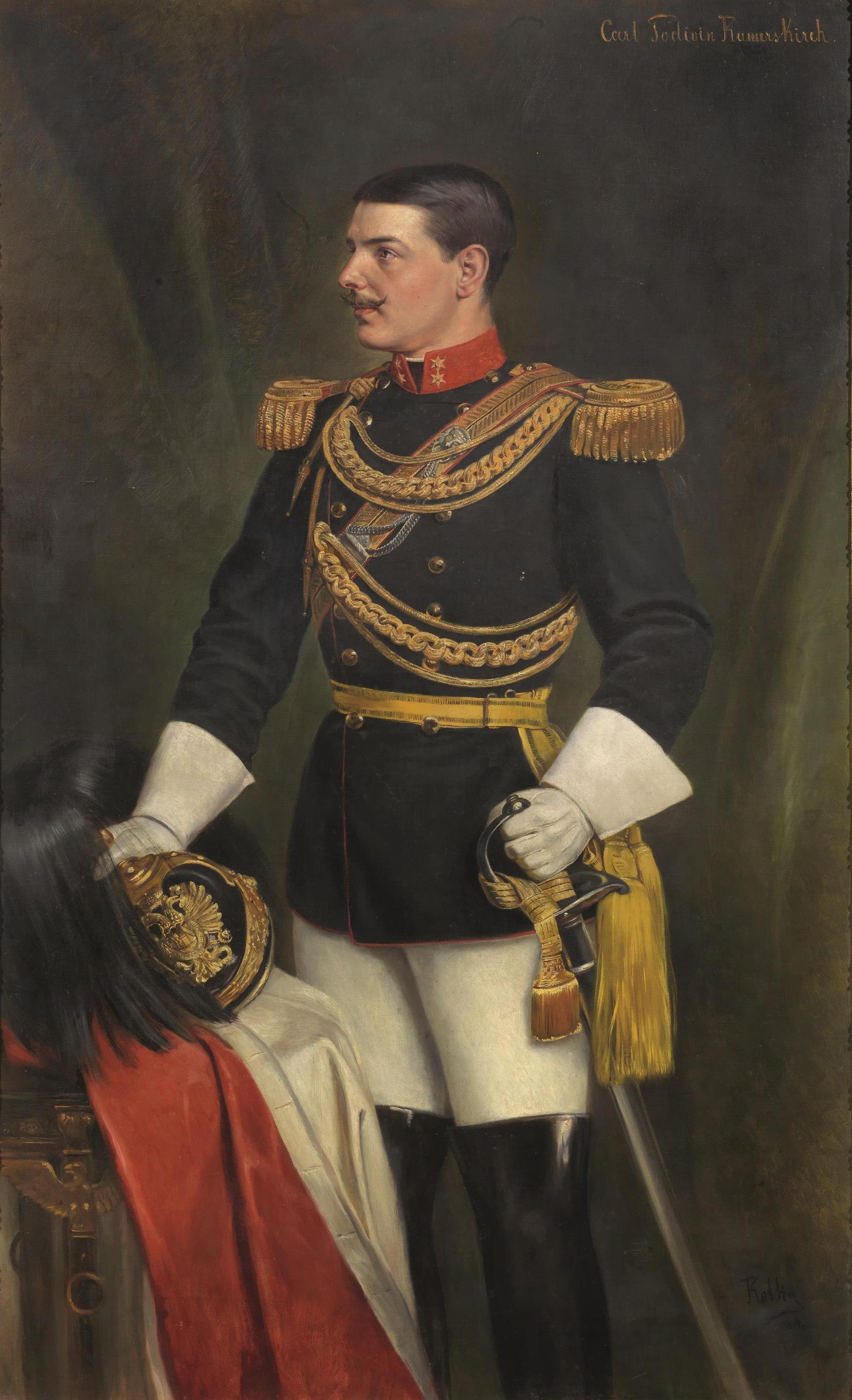
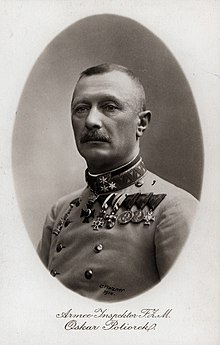
Sophie then whispered into Franz' ear and he paused and then told the mayor that he could speak.
Franz and Sophie wanted to visit all those who had been injured by the bomb at the local hospital.

The Franz' chamberlain, Baron Rumerskirch, wanted them to stay at the Town Hall until troops could be brought into the city to line the streets.

However, Governor-General Oskar Potiorek said no to this because soldiers coming straight from maneuvers would not have time to dress properly. He followed this ridiculous justification by saying, "Do you think that Sarajevo is full of assassins?"

To be on the safe side, Potiorek wanted to avoid the city center on the way to the hospital, but he failed to tell that to his drivers. When Potiorek noticed that they weren't going the way he had planned, he called out to the driver to stop.
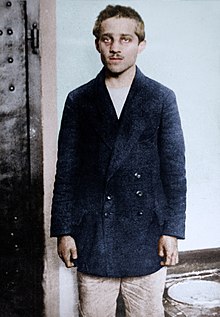
The driver applied the brakes and attempted to reverse the car, but it stalled. That was when another member of the Black Hand named Gavrilo Princip stepped up to the running board and shot Franz and Sophie with a 380 caliber pistol. Franz had been hit in the jugular vein followed by Sophie in her abdomen. Sophie immediately fell unconscious and collapsed into Franz' lap. Franz pleaded,"Sophie, Sophie! Don't die! Live for our children!" followed by telling Harrach's that his injuries were "nothing." Franz then passed out too.
Some say that Franz and Sophie were then driven to the hospital and others say the Governor's mansion and others say it was the hospital. Some say Sophie died first and others say it was Franz. Regardless, they both died within minutes of being shot.


Allegedly, the Serbian Prime Minister learned of the assassination attempt prior to the attack and made a vague attempt to warn the Austrians, but they didn't take it seriously.
After Franz' death, Oskar Potiorek organized riots against ethnic Serbs and the police and local authorities in the city did nothing to prevent anti-Serb violence.
On June 29th, 1914, more aggressive demonstrations transpired as well as violent riots. Local political leaders held speeches to these crowds, some played important role in bringing crowds together and directing them against places belonging to Serbs.
After the bodies of Franz Ferdinand and his wife were transported to Sarajevo's railway station, order in the city was restored.
Anti-Serb demonstrations and riots also spread to many other larger Austro-Hungarian cities. In Bosnia and Herzegovina prominent Serbs were imprisoned and extradited. And a predominantly Muslim special militia known as the Schutzkorps was established and carried out the persecution of Serbs.
Austro-Hungarian diplomat Count Hoyos, traveled to Berlin and successfully acquired German support for Austrian action against Serbia.
On July 23rd, Austria-Hungary delivered Serbia a series of demands in an effort to provoke a war with them. Two days later Serbia decreed general mobilization. They accepted all the terms of the ultimatum except for article six, which demanded that Austrian delegates be allowed in Serbia for the purpose of participation in the investigation into the assassination. Following this, Austria broke off diplomatic relations with Serbia. And Russia, in support of Serbia, declared partial mobilization against Austria-Hungary.
On July 28th, Austria-Hungary declared war on Serbia and on the 30th, Russia ordered general mobilization.
On the 31st, Kaiser Wilhelm II asked his cousin, Tsar Nicolas II, to suspend the Russian general mobilization. When he refused, Germany demanded the mobilization be stopped, and a commitment not to support Serbia. They also asked France not to support Russia if it were to come to the defense of Serbia. The next day, after the Russian response, Germany mobilized and declared war on Russia.
“This is a dark day and a dark hour. The sword is being forced into my hand. This war will demand of us enormous sacrifice in life and money, but we shall show our foes what it is to provoke Germany.”
– Kaiser Wilhelm II
This was the official start of World War 1.
On August 2nd, Hitler allegedly was in the crowd celebrating as German troops invaded Luxembourg. On first hearing the news of war Hitler had sunk to his knees and thanked heaven for being alive.
"For me, as for every German, there now began the greatest and most unforgettable time of my earthly existence. Compared to the events of this gigantic struggle, everything past receded to shallow nothingness." -Hitler

Luxembourg is a landlocked by Belgium, Germany and France. Since the 1867 Luxembourg had been an explicitly neutral state. But after Franz's death, Germany was anticipating a retaliatory declaration of war from Russia's closest western ally, France. They thought that France was ready to invade Luxembourg itself. So, Germany decided to launch a lightning attack on France through the poorly defended low countries, bypassing France's main defenses. Germany's army would be able to encircle Paris and force France to surrender.
On August 3rd, Germans invaded Belgium and declared war on France. Britain then sent an ultimatum to Germany to withdraw from Belgium, which they rejected. And Italy announced that they would stay neutral. The next day, Britain declared war on Germany. This meant that Canada, Australia, New Zealand, India and South Africa were also at war with Germany. The United States announced it was staying neutral.
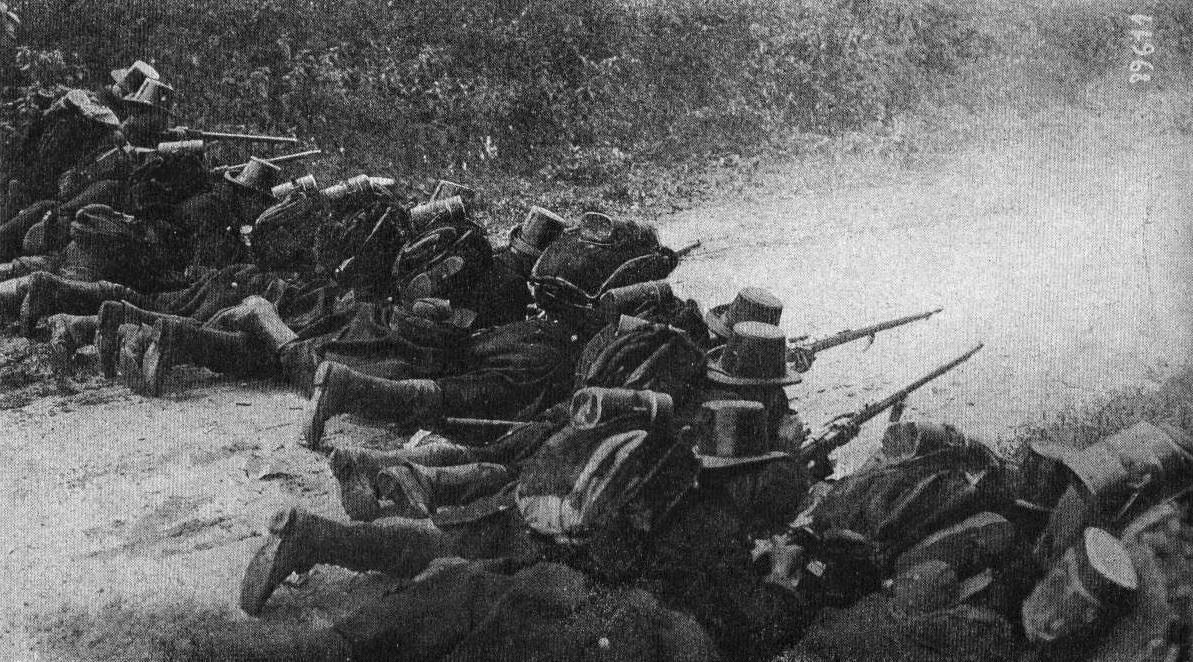

Railways in the Meuse river valley needed by the German armies in eastern Belgium were closed.
The next day Austria-Hungary declared war on Russia and Serbia declared war on Germany. Followed a few days later by the Kingdom of Montenegro declaring war on Austria-Hungary.
The Kingdom of Montenegro was a monarchy in southeastern Europe. It allied itself with the Triple Entente(informal agreement between the Russian Empire, the French Third Republic and the United Kingdom) in line with King Nicholas' pro-Serbian policy.
On August 12th, Great Britain and France declared war on Austria-Hungary. Followed by Serbia getting invaded by Austria-Hungary.
On August 16th, Hitler was summoned to report to Recruiting Depot VI in Munich and enlisted as private No. 148 in the 1st Company, 16th Bavarian Reserve Infantry Regiment. Since Hilter was an Austrian citizen, Bavarian authorities concluded years and years later that Hitler being able to fight in Bavaria must have been a clerical error and he should have been sent back to Austria.
Hitler left his room at the Schliesheimerstrasse and moved to Türkenkaserne, which was the Bavarian Army barracks in the Maxvorstadt district of Munich.

On August 17th, the Russians invaded East Prussia.
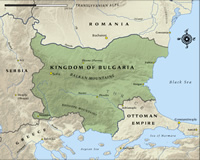
On August 19th, the Ottoman Empire and Bulgaria signed an alliance.
The Ottoman Empire was centered in Turkey and controlled the eastern and southern lands around the Mediterranean. The empire was a collection of conquered countries.
U.S. President Woodrow Wilson addressed United States Congress "Such divisions amongst us would be fatal to our peace of mind and might seriously stand in the way of the proper performance of our duty as the one great nation at peace, the one people holding itself ready to play a part of impartial mediation and speak the counsels of peace and accommodation, not as a partisan, but as a friend."
So, basically he was trying to get everybody to be friends and also announcing that the United States would still be abstaining from battle.
On August 21st, Hitler signed out from Munich.
On August 22nd, Austria-Hungary declared war on Belgium
On August 23rd, after Germany didn't respond to the demand, that Japan made on August 15th, Japan declared war on Germany. The Japanese then prepare to assist the British in expelling the Germans from the Far East. Also, Austria-Hungry invaded Russian Poland.

In Tannenberg, the main battle began between the Russian and the Germans. The Germans use their railway system to surround the Russians and inflict heavy causalities. This resulted in the almost complete destruction of the Russian Second Army and the suicide of its commanding general, Alexander Samsonov.
On August 30th, intending to terrorize civilians, Germans bombed Paris and killed one civilian.
On September 1st, Hitler was posted to the Bavarian Reserve Infantry Regiment 16. He was trained in weapons and marching. It was said that when Hitler was issued his rifle “he looked at it with delight, as a woman looks at her jewelry".

On September 4th, the Russians seized Lemberg from Austria-Hungary. The next day German invasion of France is stopped in the First Battle of the Marne as German troops are forced to the north side of the Marne River.
On September 12th, Germans captured Gumbinnen (now Gusev) as the Russians retreated.
On September 14th, the Russians withdrew from East Prussia allowing the area to be let under control of the Germans.
On September 17th, German New Guinea governor Eduard Haber surrendered to Australian forces.
German New Guinea consisted of the northeastern part of the island of New Guinea and several nearby island groups and was the first part of the German colonial empire.
On October 4th, the French failed to hold back the German advance and lost Lens in northern France.
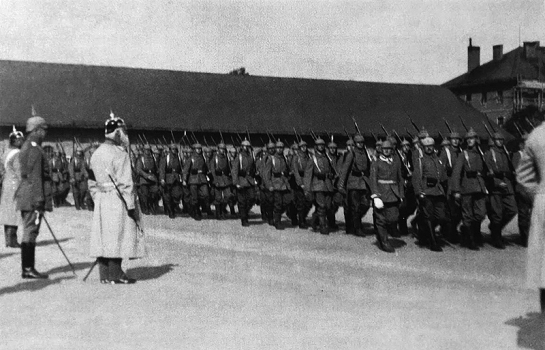
On October 8th, Hitler’s regiment was present at a farewell ceremony at the Türkenkaserne. The next day he completed his basic military training.
On October 10th, Hitler’s regiment left Munich by foot for a large training in the area of Kloster Lechfeld, which was 70 miles to the west. In full combat gear, the men marched in a continuous rain for 11 hours. Hitler and his company was put up in a barn for the night, but that no one could sleep because they were soaked through and shivering from the cold.

On October 12th, the trial for 17 of the conspirators in the assassination of Franz Ferdinand began in Sarajevo. Gavrilo Princip admitted in court his motivation for assassination was purely political: "I am a Yugoslav nationalist and I believe in unification of all South Slavs in whatever form of state and that it be free of Austria ... By means of terror."
On October 13th, Hitler’s First Battalion arrived in Klosterlechfeld.
Klosterlechfeld is a municipality in the district of Augsburg in Bavaria.
Howitzer
Germans and Austrians bombarded the Belgian fortress city and Liege Forts into submission with Howitzers. Remaining Belgians then retreated north toward Antwerp as the Germans advanced towards France. As the Germans advanced, they shot civilians and executed a Belgian priest they had accused of inciting civilian resistance.On October 17th, Hitler completed supplementary military training. Two days later the First Battle of Ypres began as German, French and British forces advanced to encounter each other at the western Belgian town of Langemark.
On October 20th, Hitler sent a letter to his former landlord Popp about the training in the Lechfeld area. The next day his regiment traveled by train from München, along the Rhine. The men sang “The Watch on the Rhine” and broke into cheers when they finally saw the great river, which was the first time that most of them had ever laid eyes on it.
On October 22nd, the men disembarked from the train and, after reorganizing, marched to Lille, Belgium, which had been recaptured by the Germans from the British.
On October 23rd, Hitler and his regiment arrived in Lille and marched through the desolate town. Hitler became nervous when British shells began to land, since the town was full of ammunition carts and soldiers. The shelling did not last long, and the men bedded down on the wet and cold flagstones of the town’s streets. They then spend a few days traveling to Geluveld. On their way there they spent nights in castle gardens and a destroyed farm.
On October 29th, Turkey entered the war on Germany’s side and the List-regiment fought its first battle during the First Battle of Ypern (Belgium). When Hitler and his regiment went through some woods. After that, they arrived at a meadow-land. The Regiment got into a fight near the road to Beselare. At dawn the attack began. It was foggy and the regimental hats that they were wearing brought trouble. A regiment of troop from the army of the German state of Württemberg thought the Bavarians were British and opened fire, inflicting heavy causalities. Hitler and his friend Ernst Schmidt threw their caps away instantly and ran to the rear headquarters to report the situation and stop the slaughter. At one point, a shell exploded near him; it killed another soldier, but Hitler only had a sleeve ripped away. 2,500 of the 3,000 men in the Hitler's regiment were killed, wounded or missing.
Hitler was described as an unusual with a sloppy manner and unmilitary bearing. He was also eager for action. He never complained about bad food and the horrible conditions or talked about women. Instead he preferred to discuss art or history. He received a few letters but no packages from home and never asked for leave.
On November 3rd, Hitler became a dispatch runner, taking messages back and forth from the command staff in the rear to the fighting units near the battlefield. The runners traveled in pairs, armed only with pistols and carrying a leather wallet attached to their belts.
On Hitler’s first run during the Battle of Messines, six miles southwest of Ypres, three runners were killed and one wounded of the eight on staff. On the second day, the regimental commander was wounded near Hitler and Schmidt; under heavy fire, Hitler and a fellow soldier carried their wounded commander to an aid station.
On November 5th, Britain and France declared war on the Ottoman Empire.
On November 9th, Hitler was promoted to lance corporal for his bravery at the Battle of Messines. After this Hitler would end up spending nearly half his time at the regimental headquarters in Fournes-en-Weppes. In in his spare time he would take out his watercolors and paint the landscapes of war.
By November 22nd, the Allies had defeated the Germans at the First Battle of Ypres.
On December 2, Hitler was decorated with the Iron Cross 2nd Class. Later, Hitler would claim that this was “the happiest day of my life.” The regiment was pulled back from the front for rest.
On December 24th, an unofficial truce was declared between the two sides at Christmas.



No comments:
Post a Comment